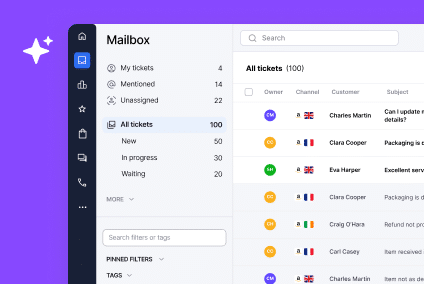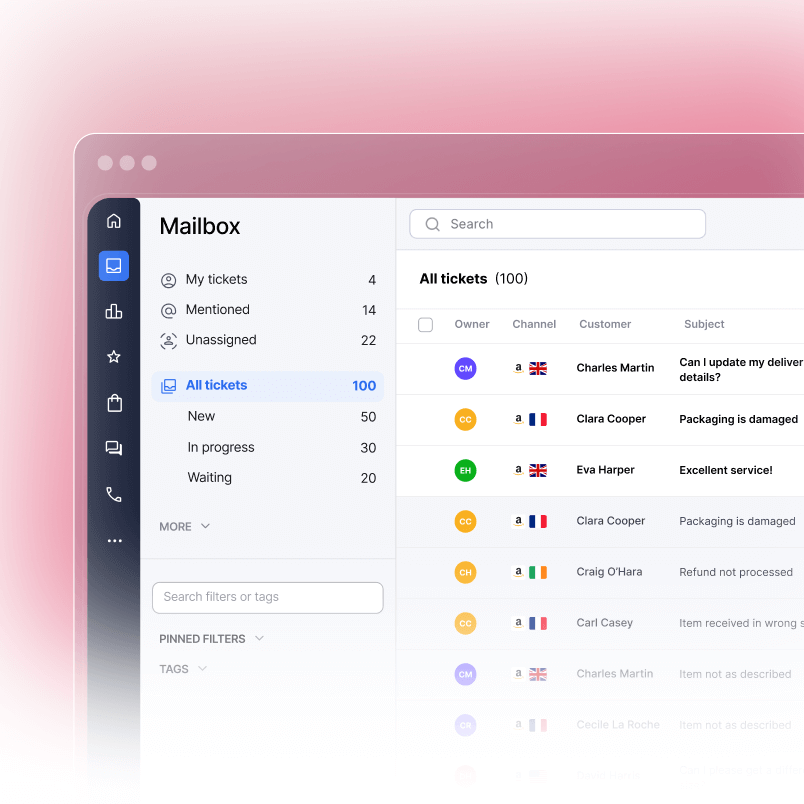eCommerce in 2025 runs on AI. From customer service automation to intelligent inventory forecasting, these five AI tools are essential for scaling efficiently. This guide compares features, use cases, and pricing to help online retailers choose the right tools for growth, whether you’re managing support tickets, personalizing product discovery, or optimizing stock levels.
Why AI Tools Are Crucial for eCommerce in 2025
The eCommerce landscape has fundamentally shifted. Customer expectations have skyrocketed, competition has intensified, and operational complexity has grown exponentially. AI tools are no longer optional, they’re essential infrastructure for online retailers who want to compete effectively.
Here’s why AI adoption is accelerating across eCommerce:
- Fast-growing automation demands: Manual processes can’t scale with order volume growth
- Rising customer expectations: Shoppers expect instant, personalized responses 24/7
- Data-driven decision making: AI turns customer data into actionable insights
- Operational efficiency: Automation reduces costs while improving service quality
- Competitive advantage: Early AI adopters are outpacing competitors on key metrics
Common AI Use Cases in eCommerce
AI tools are transforming multiple aspects of online retail operations:
- Customer support automation: Intelligent chatbots and auto-responses that handle routine queries
- Product recommendations: Personalized suggestions based on browsing and purchase history
- Inventory forecasting: Predictive analytics that prevent stockouts and overstock
- Fraud detection: Real-time analysis of suspicious transactions and patterns
- Dynamic pricing: Automated price optimization based on demand and competition
- Content generation: AI-written product descriptions, emails, and marketing copy
- Search optimization: Natural language processing for better on-site search results
The retailers thriving in 2025 aren’t just using one AI tool, they’re strategically combining multiple solutions to create a competitive advantage across their entire operation. Understanding how AI is revolutionizing customer support for eCommerce is the first step toward implementing these transformative technologies.
The Top 5 AI Tools for eCommerce in 2025
After analyzing dozens of solutions and consulting with eCommerce experts, we’ve identified five AI tools that stand out for their impact, reliability, and ROI. Each serves a distinct purpose, and together they cover the essential functions every modern online retailer needs.
1. eDesk – AI-Powered Customer Support & Multichannel Helpdesk
Quick Summary: The most comprehensive AI-driven helpdesk purpose-built for eCommerce sellers managing support across multiple channels and marketplaces.
Best For: Multichannel customer support automation, marketplace message management, and team collaboration
Key Features:
- Smart Inbox: Automatically consolidates messages from Amazon, eBay, Shopify, Walmart, and 250+ channels into one unified dashboard
- AI Sentiment Analysis: Tags customer messages by sentiment (positive, neutral, negative) to prioritize urgent issues
- Automated Responses: AI-powered reply suggestions and templates that maintain your brand voice
- Translation Support: Real-time translation for international customer communications
- SLA Tracking: Monitor response times across all channels to meet marketplace requirements
- Customer View: Complete customer history and order details in one place
- Team Collaboration Tools: Internal notes, ticket assignment, and performance analytics
- Deep Integrations: Native connections with Amazon Seller Central, eBay Resolution Center, Shopify, and major shipping carriers
Pricing Info: Plans start at $49/month with a 14-day free trial available
Why It’s a 2025 Must-Have:
As eCommerce businesses expand across multiple sales channels, managing customer support becomes exponentially more complex. eDesk consolidates support from over 250 marketplaces and channels, preventing missed messages and ensuring no customer query falls through the cracks.
The platform’s AI capabilities go beyond basic automation. The sentiment tagging feature helps support teams prioritize genuinely unhappy customers who might leave negative reviews, while automated response suggestions dramatically reduce average handling time. For businesses selling on Amazon, eDesk’s integration pulls in buyer-seller messages and case data directly from Seller Central, ensuring compliance with Amazon’s buyer-seller messaging guidelines.
What sets eDesk apart is its eCommerce-specific design. Unlike generic helpdesks like Zendesk or Freshdesk that require extensive customization, eDesk’s smart inbox understands marketplace SLAs, order tracking, and returns management out of the box. The platform is trusted by over 5,000 retailers including brands like Superdry, who rely on it to manage high-volume support operations efficiently.
For sellers looking to scale without proportionally scaling their support team, eDesk’s automation features can reduce ticket volume by up to 40% while improving response times and customer satisfaction scores. Learn more about the top 10 ways to use AI in eCommerce customer support to maximize your results.
Try eDesk free for 14 days and experience AI-powered customer support built specifically for eCommerce.
2. Shopify Magic – AI Suite for Content & Personalization
Quick Summary: Shopify’s native AI toolkit that helps merchants create product descriptions, emails, and personalized shopping experiences without leaving their admin panel.
Best For: Shopify merchants seeking integrated AI for content creation and customer personalization
Key Features:
- AI Content Generation: Creates product descriptions, email copy, and marketing messages in seconds
- Personalized Recommendations: Dynamic product suggestions based on customer behavior
- Shopify Inbox AI: Smart replies for customer conversations through Shopify’s messaging platform
- Analytics Integration: AI-powered insights directly in Shopify admin dashboard
- Image Enhancement: Background removal and image editing for product photos
- SEO Optimization: Suggests keyword-optimized descriptions and meta tags
Pricing Info: Included with Shopify plans (Basic at $39/month and above)
Why It’s a 2025 Must-Have:
For Shopify merchants, the biggest advantage of Shopify Magic is its seamless integration. There’s no separate login, no data export/import hassles, and no learning curve for a new interface. The AI tools appear exactly where merchants need them, right in the product editor, email composer, and customer conversation panel.
The content generation feature is particularly valuable for stores with large catalogs. Instead of spending hours writing unique descriptions for hundreds of products, merchants can generate compelling, SEO-friendly copy in seconds. The AI understands eCommerce copywriting best practices and maintains consistency across product pages.
Shopify’s personalization engine also helps stores deliver the kind of tailored shopping experience that customers expect from major retailers like Amazon, but without requiring a data science team. The system automatically learns from customer behavior patterns and adjusts product recommendations to maximize conversion rates.
As Shopify continues investing heavily in AI development, merchants using the platform benefit from regular feature updates and improvements at no additional cost. For those considering Shopify, check out our comparison of Shopify vs WooCommerce to see if it’s the right platform for your business.
If you’re a Shopify merchant looking to enhance your customer support capabilities, explore the best Shopify customer service apps or learn about Shopify customer support automation strategies.
3. Klevu – AI-Driven Site Search & Product Discovery
Quick Summary: An intelligent search platform that uses natural language processing and machine learning to help shoppers find products faster and increase conversion rates.
Best For: Stores with large catalogs where on-site search significantly impacts sales
Key Features:
- Natural Language Processing: Understands search intent beyond exact keyword matches
- Autocomplete Suggestions: Smart recommendations as customers type
- Visual Merchandising: AI-powered product ranking based on performance data
- Personalization Engine: Tailors search results to individual shopper preferences
- Mobile Optimization: Fast, responsive search optimized for mobile shoppers
- Analytics Dashboard: Detailed insights into search behavior and missed queries
- A/B Testing: Test different search algorithms to optimize performance
Pricing Info: Custom pricing based on store size and traffic volume
Why It’s a 2025 Must-Have:
Site search is often overlooked, but statistics show that shoppers who use search convert at 2-3 times the rate of those who don’t. The problem is that default eCommerce platform search engines are notoriously poor at understanding customer intent. A shopper searching for “red dress” might miss relevant products tagged as “crimson gown” or “scarlet frock.”
Klevu solves this by understanding synonyms, common misspellings, and even product attributes that aren’t explicitly mentioned in titles. If a customer searches for “waterproof hiking boots,” Klevu can surface products that mention “water-resistant” or have relevant technical specifications, even if the exact phrase doesn’t appear in the product name.
The platform’s visual merchandising capabilities also give store owners control over search results without manual sorting. The AI learns which products perform best for specific queries and automatically adjusts rankings to maximize revenue. This is particularly valuable during seasonal shifts or promotional periods when certain products should be prioritized.
Fashion and beauty brands have seen particularly strong results with Klevu, as these categories often involve subjective search terms where traditional keyword matching fails. The personalization layer ensures returning customers see results tailored to their style preferences and past behavior.
For more insights on improving your eCommerce store’s performance, explore our guide on how to increase eCommerce conversion rates.
4. Lily AI – Product Attribution & Image-Based Tagging
Quick Summary: An AI solution that automatically enriches product data with customer-centric attributes and tags, improving discoverability and personalization.
Best For: Fashion, beauty, and home goods brands with complex product attributes
Key Features:
- Automated Product Tagging: AI analyzes images and descriptions to add relevant attributes
- Customer Language Mapping: Translates technical specs into how customers actually search
- Visual Recognition: Identifies product characteristics from images alone
- Attribute Enrichment: Adds detailed metadata for better search and filtering
- Personalization Support: Enriched data powers more accurate recommendations
- Retail Media Integration: Improved product data for advertising platforms
Pricing Info: Enterprise pricing, typically for mid-market to large retailers
Why It’s a 2025 Must-Have:
Product attribution is one of the most tedious tasks in eCommerce merchandising, yet it’s critical for helping customers find what they’re looking for. Manually tagging thousands of products with attributes like “fit type,” “occasion,” “material,” and “style” is time-consuming and prone to inconsistency.
Lily AI automates this process using computer vision and natural language processing. The system analyzes product images, descriptions, and customer reviews to automatically generate comprehensive attribute sets. More importantly, it uses language that actual customers use when searching, not just technical specifications from manufacturers.
For example, a dress manufacturer might describe a product as “midi-length A-line silhouette with three-quarter sleeves.” Lily AI recognizes that customers might search for “work dress,” “office outfit,” or “professional attire” and adds these attributes accordingly.
This enriched product data doesn’t just improve on-site search and filtering, it also enhances email personalization, advertising targeting, and recommendation engines. Retailers using Lily AI report significant improvements in product discovery metrics and reduced return rates because customers find items that better match their expectations.
The platform is particularly valuable for stores carrying multiple brands, as it creates consistency in attribute standards across disparate product catalogs that often use different terminology and classification systems.
5. Zebra Prescriptive Analytics – Inventory & Pricing Optimization
Quick Summary: An AI-powered analytics platform that provides prescriptive recommendations for inventory levels, pricing strategies, and loss prevention.
Best For: Retailers with complex inventory challenges, multiple locations, or significant shrink concerns
Key Features:
- Demand Forecasting: Predicts future inventory needs based on historical data and trends
- Dynamic Pricing Recommendations: Suggests optimal price points to maximize margin and velocity
- Shrink Analytics: Identifies patterns indicating theft or inventory loss
- Markdown Optimization: Determines when and how much to discount slow-moving inventory
- Multi-Location Intelligence: Optimizes stock distribution across stores or warehouses
- Prescriptive Actions: Goes beyond reporting to recommend specific actions
Pricing Info: Custom enterprise pricing based on implementation scope
Why It’s a 2025 Must-Have:
Inventory management represents one of the largest cost centers for physical goods retailers, yet many businesses still rely on spreadsheets and gut feeling. Overstocking ties up capital and increases carrying costs, while stockouts result in lost sales and disappointed customers. Getting this balance right is where AI shows dramatic ROI.
Zebra Prescriptive Analytics uses machine learning models trained on retail data to predict future demand with remarkable accuracy. The system considers seasonality, trends, promotional calendars, weather patterns, and dozens of other variables that human planners might miss or underweight.
What distinguishes Zebra from descriptive analytics tools is the prescriptive aspect, it doesn’t just show you what’s happening, it tells you what to do about it. Instead of a report showing “Product X is selling slower than projected,” you get actionable recommendations like “Markdown Product X by 15% for the next two weeks, then discontinue if sell-through doesn’t improve.”
The pricing optimization module is particularly sophisticated, using competitor intelligence and elasticity modeling to recommend prices that maximize profit rather than just matching competition. This is especially valuable in categories where small price adjustments significantly impact conversion rates.
Retailers with multiple locations benefit from the platform’s ability to optimize inventory distribution, ensuring the right products are in the right places at the right times, reducing both stockouts and excess inventory across the network.
For more strategies on managing inventory effectively, read our guide on how to optimize and streamline your inventory management process.
AI Tool Comparison Table
| Tool | Best For | Key Feature | Pricing Tier |
| eDesk | Customer Support | Smart Inbox, Auto-Reply, Sentiment Analysis | Starts at $49/mo |
| Shopify Magic | Content Generation | AI Emails, Descriptions, Personalization | Included in Shopify plans |
| Klevu | On-Site Search | NLP Search, Product Discovery | Custom pricing |
| Lily AI | Product Tagging | Image Recognition, Attribution | Enterprise |
| Zebra Analytics | Inventory & Pricing | Prescriptive Insights, Demand Forecasting | Custom pricing |
How to Choose the Right AI Tool for Your Store
Selecting AI tools shouldn’t be about chasing the latest technology trends, it should be a strategic decision based on your specific business challenges and growth goals. Here’s how to evaluate which solutions will deliver the most value for your operation.
Match Features to Pain Points
Start by identifying your biggest operational bottlenecks:
- Drowning in customer messages? → Prioritize support automation like eDesk
- Poor on-site conversion despite good traffic? → Focus on search and discovery like Klevu
- Spending too much time writing product content? → Content generation tools like Shopify Magic
- Frequent stockouts or excess inventory? → Inventory intelligence like Zebra Analytics
- Low product discoverability? → Attribution and tagging solutions like Lily AI
The AI tool that addresses your most expensive problem should take priority, even if other solutions seem more exciting. Understanding what to look for in eCommerce helpdesk software can help you make informed decisions about customer support tools.
Prioritize Integrations
An AI tool is only valuable if it connects seamlessly with your existing technology stack. Before committing to any solution, verify compatibility with:
- Your eCommerce platform (Shopify, WooCommerce, BigCommerce, Magento)
- Marketplaces where you sell (Amazon, eBay, Walmart)
- Your shipping and fulfillment systems
- Email marketing and CRM platforms
- Analytics and business intelligence tools
Native integrations are preferable to workarounds or custom development, which add cost and maintenance burden. For example, eDesk offers native integrations with over 250 channels including Amazon, eBay, Shopify, Walmart, Magento, and WooCommerce, eliminating the need for manual data transfers or middleware solutions.
For sellers on specific platforms, check out our integration guides:
- TikTok Shop customer support
- WhatsApp Business integration
- Facebook customer service tools
- BigCommerce helpdesk solutions
Budget vs ROI Considerations
AI tools range from included features in existing platforms to enterprise solutions costing thousands per month. Consider both immediate costs and longer-term return on investment:
Immediate Cost Factors:
- Monthly or annual subscription fees
- Implementation and onboarding costs
- Training time for your team
- Potential need for technical support or consultants
ROI Calculation:
- Time saved on manual tasks (calculate hourly value of staff time)
- Revenue impact from improved conversions or customer retention
- Cost reduction from operational efficiency
- Risk mitigation (fewer missed messages, better inventory decisions)
For most small to mid-size eCommerce businesses, customer support automation through tools like eDesk delivers the fastest ROI because the time savings are immediate and measurable. A support tool that reduces average ticket handling time from 10 minutes to 6 minutes effectively increases your team’s capacity by 40% without hiring.
Learn more about choosing the best AI chatbot for eCommerce to maximize your investment.
Implementation Timeline Checklist
☐ Audit current processes – Document existing workflows and pain points
☐ Define success metrics – Establish baseline measurements before implementation
☐ Research integration requirements – Confirm technical compatibility
☐ Request demos and trials – Test with real data when possible
☐ Calculate total cost of ownership – Include setup, training, and ongoing costs
☐ Plan rollout strategy – Decide whether to implement all at once or phase in gradually
☐ Assign implementation owner – Designate someone responsible for project success
☐ Set review checkpoints – Schedule evaluation meetings at 30, 60, and 90 days
Start Small, Scale Smart
You don’t need to implement all five tools simultaneously. Many successful retailers start with one solution (often customer support automation), measure results, optimize the implementation, and then add complementary tools once the first is running smoothly.
This phased approach reduces risk, allows your team to build AI literacy gradually, and provides proof of concept that helps justify investment in additional tools.
Looking to transform your customer support with AI? Book a demo with eDesk to see how purpose-built eCommerce AI can reduce ticket volume while improving customer satisfaction. You can also explore our comprehensive eCommerce customer service guide for more strategies.
FAQs
What is the best AI tool for eCommerce customer support?
eDesk is the leading AI-powered customer support solution specifically built for eCommerce businesses. Unlike generic helpdesk software, eDesk provides native integrations with over 250 marketplaces and channels, including Amazon Seller Central, eBay, Shopify, and Walmart. The platform uses eDesk AI for sentiment analysis, automated response suggestions, and smart ticket routing, helping support teams handle higher volumes while maintaining quality. For multichannel sellers managing customer inquiries across multiple platforms, eDesk’s unified inbox and marketplace-specific features (like eBay case management and Amazon feedback tracking) make it the most comprehensive solution available. Learn more about AI customer support for eCommerce.
Are AI tools expensive to implement?
AI tool costs vary significantly based on features and scale. Entry-level options start around $59/month (like eDesk’s basic plan), while enterprise solutions may cost thousands monthly. However, ROI typically exceeds costs quickly through time savings and revenue protection. For example, customer support AI that reduces average handling time by just 4 minutes per ticket saves substantial labor costs over time. Many tools offer free trials, allowing you to test value before committing. The key is matching tool investment to your specific pain points, implementing AI for your biggest operational challenge usually delivers positive ROI within the first quarter. Check out eDesk’s pricing to find a plan that fits your budget.
Can these tools integrate with Shopify or WooCommerce?
Yes, most leading AI tools offer native integrations with major eCommerce platforms. eDesk provides direct connections to Shopify, WooCommerce, BigCommerce, and Magento, automatically pulling order data and customer information into your support inbox. Shopify Magic is built directly into Shopify’s admin panel, requiring no separate integration. Klevu supports all major platforms through plugins and API connections. When evaluating any AI tool, verify that your specific platform and version are supported, and check whether the integration is native (preferable) or requires middleware solutions. For Shopify users specifically, explore our guide on the best help desk apps for Shopify.
Is AI reliable for handling customer queries?
Modern eCommerce AI tools are highly reliable for routine customer queries but work best in partnership with human agents rather than as complete replacements. AI excels at handling repetitive questions (order status, return policies, shipping information) that don’t require nuanced judgment. For example, AI-powered automation can reduce support ticket volume by up to 40% by providing instant answers to common questions. However, complex issues, emotionally charged complaints, or situations requiring policy exceptions still benefit from human oversight. The most effective approach uses AI to handle straightforward queries and intelligently route complex issues to human agents, maximizing both efficiency and customer satisfaction. Learn more about how AI customer service works and AI-powered eCommerce customer support.
How long does it take to implement AI tools for eCommerce?
Implementation timelines vary by tool complexity and business size. Customer support platforms like eDesk can be operational within 1-2 weeks, including channel integrations and team training. Content generation tools like Shopify Magic are available immediately since they’re built into existing platforms. More complex solutions like inventory analytics or product attribution systems may require 4-8 weeks for full implementation, including data migration and algorithm training. Most vendors provide onboarding support to accelerate deployment. The key is setting realistic expectations and dedicating adequate time for staff training, even the best AI tool fails without proper team adoption.
Do I need technical expertise to use AI eCommerce tools?
Most modern AI eCommerce tools are designed for business users without technical backgrounds. Platforms like eDesk, Shopify Magic, and Klevu feature intuitive interfaces that require no coding knowledge. Initial setup might benefit from technical support (often provided by the vendor), but day-to-day operation is accessible to anyone comfortable with eCommerce admin panels. Enterprise solutions like Zebra Analytics may require more technical involvement during implementation, but ongoing use focuses on interpreting insights rather than managing technical infrastructure. When evaluating tools, prioritize those offering comprehensive documentation, training resources, and responsive customer support to minimize technical barriers. eDesk provides extensive support through its knowledge base and customer success team.
Can AI tools help with international eCommerce operations?
Absolutely. AI tools are particularly valuable for international eCommerce operations because they automate translation, adapt to local customer behaviors, and operate 24/7 across time zones. eDesk includes real-time translation features that allow support teams to communicate with customers in multiple languages without manual translation services. Personalization engines like Klevu and Lily AI adapt product recommendations based on regional preferences and shopping patterns. For sellers expanding internationally, AI translation and multichannel support capabilities eliminate many traditional barriers to global growth, allowing small teams to provide quality service across markets that would otherwise require dedicated regional staff. Learn more about international customer service best practices and multi-language customer support.
Transform Your eCommerce Operations with AI
The eCommerce landscape in 2025 rewards retailers who embrace AI strategically. The five tools covered in this guide represent proven solutions that deliver measurable results across the most critical aspects of online retail: customer support, content creation, product discovery, merchandising, and inventory management.
You don’t need to implement all five simultaneously, start with the tool that addresses your most pressing operational challenge. For most multichannel sellers, that’s customer support, where AI-powered helpdesks like eDesk consolidate messages from 250+ channels and use intelligent automation to dramatically improve efficiency.
The retailers thriving today aren’t necessarily those with the biggest budgets or largest teams, they’re the ones leveraging AI to work smarter, scale faster, and deliver experiences that keep customers coming back. Explore more about the benefits of AI in eCommerce and AI use cases in eCommerce to understand the full potential.
For marketplace sellers specifically, check out these resources:
- Amazon seller customer support strategies
- Walmart seller customer support tips
- eBay customer service software
- TikTok Shop customer service guide
Ready to experience purpose-built AI for eCommerce customer support? Start your free 14-day trial of eDesk or book a personalized demo to see how intelligent automation can transform your support operations.




